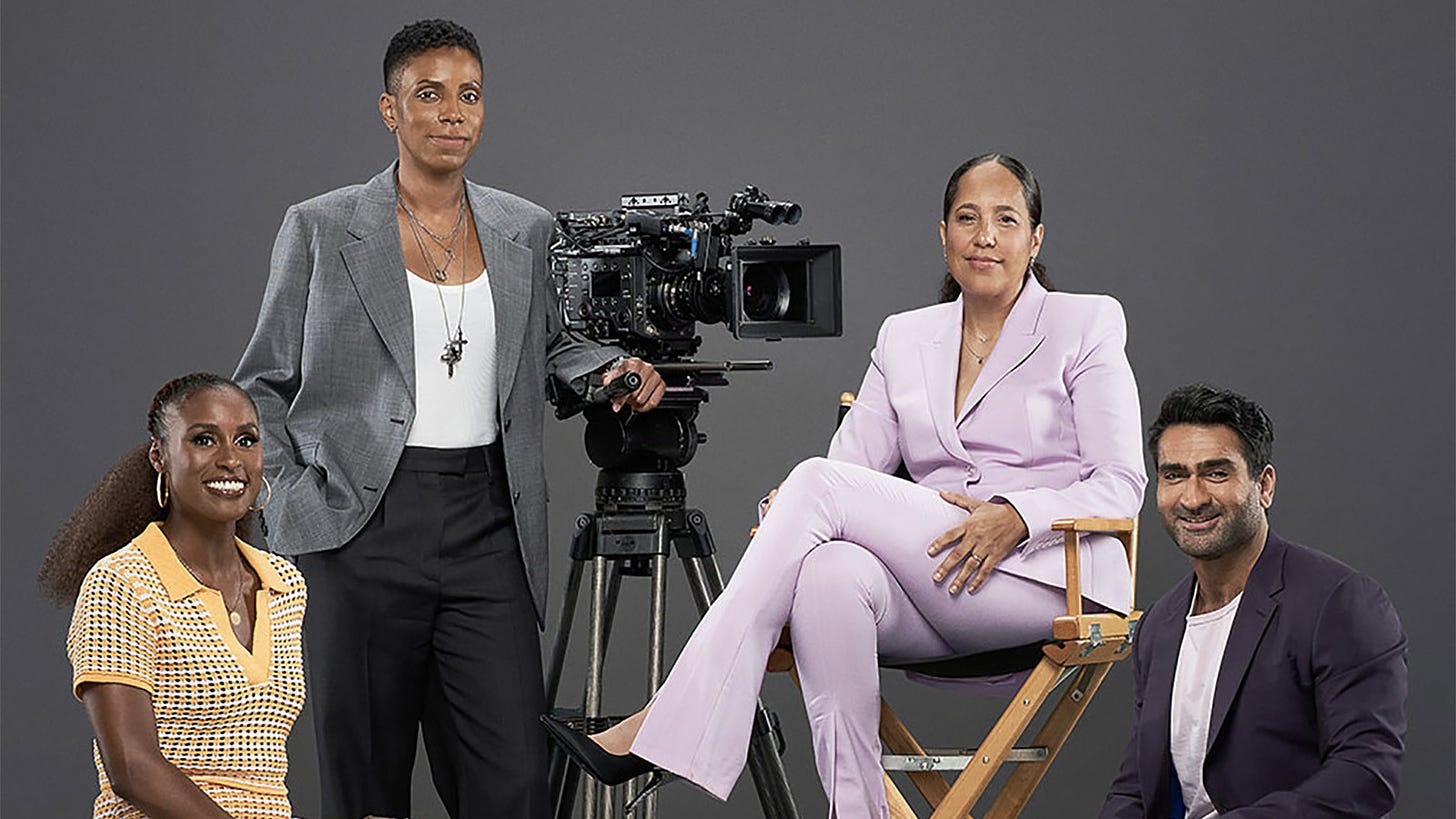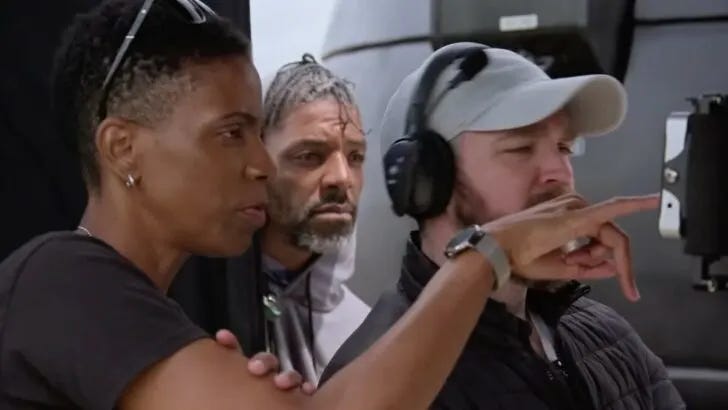The Winner is Always the Loser on 'Project Greenlight'
For its latest season, a conflict between the documentary crew and the feature crew expose the show's longstanding priorities.

In the eighth episode of the new, fifth season of Project Greenlight, released earlier this month on Max, Meko Winbush, the “winner” of the show—I’ll get to those scare quotes in a bit—is midway through production on her first feature, called Gray Matter. As usual with Project Greenlight films, the budget is extremely tight and the shooting schedule is tighter, giving Winbush only 18 days to complete a sci-fi drama with challenging effects sequences, some of them practical. The episode, titled “PGL vs. Gray Matter Problem,” references a growing tension between the documentary crew and the filmmaking crew, which together number around 120 people, each with their own conflicting agendas and shot lists. It’s like the third act of Charlie Kaufman’s Synecdoche, New York, where all the narrative architecture starts to overlap, or (almost literally) the stateroom sequence in the Marx Brothers comedy A Night at the Opera, when seemingly everyone on a ship tries to pile into one space.
The first assistant director on Gray Matter, Danny Giles, starts to revolt. The unenviable job of a first A.D. is to keep the production moving along, but between the PGL crew’s demands for access and the need to, you know, make a fucking movie, Giles has his priorities, especially when they’re filming in airless interiors. Meanwhile, Winbush herself has gotten into the habit of turning off her mic when talking to the actors, because she feels like their process is better served by intimate, one-on-one conversation. As with every season of Project Greenlight, there are all sorts of panicky moments, most of them tied to Winbush’s inexperience and ongoing issues with the script, but this is a five-alarm fire. At one point, a Senior V.P. at HBO Max, Brett Boydstun, swoops in to make it absolutely clear to Winbush and her team that closing doors and turning off mics is not acceptable under any circumstances. In any dispute between the series and the movie, the series takes precedence.
It’s a credit to Project Greenlight that it’s so transparent about a conflict that’s been embedded on the show from its inception. Documentaries, reality docs especially, are often happy to pull the curtain over their own sausage-making process, which PGL had done in its previous four seasons, leaving viewers to suss out the implication of the series/feature conflict rather than address it directly. Audiences have gotten smarter over the years about the presence of the camera in non-fiction films—having younger generations weaned on self-documentation surely helps—so the illusion of a slick 10-episode series like PGL being fly-on-the-wall isn’t as easy to sustain. But it’s nonetheless an illusion that PGL has needed to sustain in order to support its ostensible mission as a means to discover and nurture unproven young talent. Otherwise, the series starts to look like the scene from The Running Man where the previous “winners” of its violent gladiator game show are all revealed to be corpses.
After four seasons under the semi-watchful eye of Matt Damon and Ben Affleck, the fifth season of Project Greenlight has been revived by Issa Rae, who includes herself as a “mentor” along with Kumail Nanjiani and Gina Prince-Bythewood. The previous season, also done for HBO, had been something of an embarrassment for the series, which not only made it four-for-four in choosing a white guy, Jason Mann, to direct the movie but sparked a conflict with a Black producer, Effie Brown, that didn’t do Mann or Damon or the show’s reputation any favors. The obvious fix for this season is to counteract its problems with diversity and gender bias from top to bottom, including a resolution to consider only women applicants. From the pool of submissions, 10 women were asked to film the same scene from a draft of Gray Matter and the PGL team would make a decision from there. Their choice: Winbush, a quietly confident (or maybe just quiet) newcomer who hopes not to become a corpse.
The big lie of Project Greenlight hasn’t been fixed under Rae, only exposed by her own production. She and the team from Hoorae, her media production company, insist that they need to come out of PGL with a great movie, but there’s no evidence that any changes to the actual filmmaking process have occurred to make that happen. If anything, the series is more hostile to talent than ever. Not only does Winbush have a mere seven weeks to make (or help make) all the important decisions for a $3 million production, the script, written by Philip Gelatt, needs a lot of work. The hope is that Winbush, who has done some writing, can work with Gelatt to whip it into shape, which weirdly strikes no one as an unreasonable request to make of a first-time director who’d be outrageously rushed even if Robert Towne had swooped in for a polish.
The arranged marriage between director and script is a terrible idea that Project Greenlight tried in Season Two (The Battle of Shaker Heights) and Three (Feast), and again in Season Four, though Mann convinced the producers to shift to his script for The Leisure Class instead. (D’oh!) But the funniest part of the fifth season is that no one—not Winbush, not the mentors, not the teams at HBO Max or Hoorae or the film’s production company, Catchlight Studios—seems to have any passion whatsoever for the material. It is just this nagging problem that Winbush needs to solve, whether she feels an ounce of personal connection to it or not. Once again, this narcissistic mission to boost the career of an unknown talent does exactly the opposite. Winbush is made to look passive and overwhelmed while her benefactors spend meeting after meeting venting their frustration. Why is this person we set up to fail failing?!
The tenor of Project Greenlight does shift a bit in the fifth season, with the on-set eruptions of Chris Moore (producer of seasons one through three) and the Mann/Brown conflicts giving way to a more sinister air of passive-aggression. (I was bored during the first episode before realizing that this was going to be more like the gangsterism of Scorsese’s The Age of Innocence than GoodFellas.) But the common thread to all five seasons is that Project Greenlight winds up reinforcing the by-committee process that strangles the life out of Hollywood movies. Though Winbush doesn’t push back against her essential powerlessness as vigorously as Mann did last season, her decision to turn off the mic when talking to her actors is a small act of rebellion with deep significance. She’s playing a losing hand as well as she can.
And make no mistake: Gray Matter is a losing hand. If I see a duller film in 2023 than this wan treatment of a mother and daughter with supernatural powers, I will have drowned face first in my own drool. That Project Greenlight remains an exciting and provocative series seems good for Project Greenlight—though the same-day streaming dump has made its release feel like a closely guarded secret—but the next “fix” should be to align with its mission for once. A $3 million budget is a pittance by Warner Bros. Discovery standards and the show will be the show regardless. If you want to find the next great director, give her time and space to connect with the material (preferably her own) and throw your support behind her vision without second guessing every single decision she tries to make. Maybe it’ll be a fiasco. But even a fiasco is better than Stolen Summer, The Battle of Shaker Heights, Feast, The Leisure Class, and Gray Matter—and producers would have a better argument that the director was responsible for shitting the bed.
The fifth season of Project Greenlight and Gray Matter are currently streaming on Max.





I thought "Why is this person we set up to fail failing?!" was the funniest line in this piece until I encountered "I will have drowned face first in my own drool." Well done, sir.
I remember the excitement of the first PGL... For some reason I thought it was on Fox then (maybe my memory has American Idol artifacts around this show), but I guess it was always on HBO. It seemed like an interesting idea, until the movie came out...
"hey kid, you've always dreamed about being a director-for-hire on a low-budget film you have no connection to, with a script you don't like, and a studio that wants to constantly meddle with it, right?"